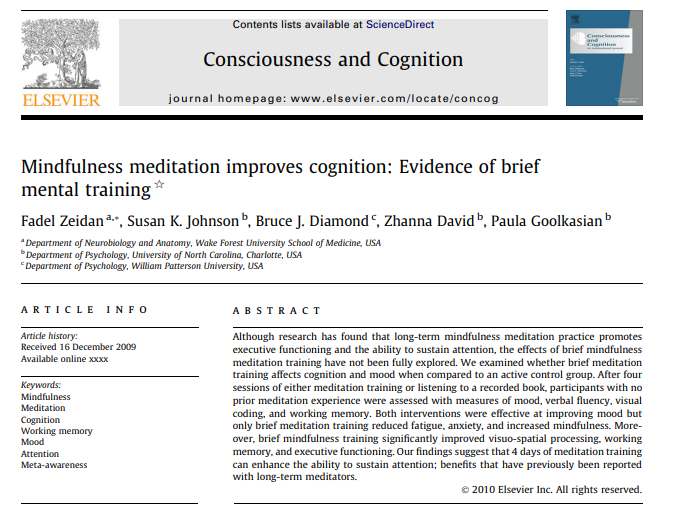Although research has found that long-term mindfulness meditation practice promotes executive functioning and the ability to sustain attention, the effects of brief mindfulness meditation training have not been fully explored. We examined whether brief meditation training affects cognition and mood when compared to an active control group. After four sessions of either meditation training or listening to a recorded book, participants with no prior meditation experience were assessed with measures of mood, verbal fluency, visual coding, and working memory. Both interventions were effective at improving mood but only brief meditation training reduced fatigue, anxiety, and increased mindfulness. Moreover, brief mindfulness training significantly improved visuo-spatial processing, working memory, and executive functioning. Our findings suggest that 4 days of meditation training
can enhance the ability to sustain attention; benefits that have previously been reported with long-term meditators.
Mindfulness meditation improves cognition: Evidence of brief mental training
Publication
Consciousness and Cognition
Abstract
Web and Email Links
Related Listings
Journal
Minn Med.
Although the physiological and biochemical changes that occur during the acute stress response have been well-characterized, the contrasting changes that underlie the relaxation response evoked by various mind-body techniques are less understood. To help guide future mind-body research, we present a conceptual model that integrates patterns of change at the physiological and molecular levels. In addition, we point to future research opportunities and discuss how repeated elicitation o […]
Journal
Annals of the New York Academy of Sciences
A wakeful hypometabolic state accompanies the practice of a relaxational, meditation technique called Transcendental Meditation. The state is characterized by decreased oxygen consumption, carbon dioxide elimination, respiratory rate and minute ventilation, with no change in respiratory quotient. Arterial blood pH and base excess decrease slightly while arterial blood lactate markedly decreases. Systolic, diastolic, and mean arterial blood pressures remain unchanged. The electroenceph […]
Journal
Behavioral Medicine
The authors compared characteristics of 1,012 outpatients completing a 10-week behavioral medicine intervention with 300 outpatients who dropped out. They administered the Symptom Checklist-90 Revised (SCL-90R) before and after the program. Patients who completed the treatment, compared with dropouts, tended to be more highly educated, married, and gainfully employed. Their pretreatment scores on the SCL-90R were significantly lower than those of the dropouts on somatization, depressi […]

